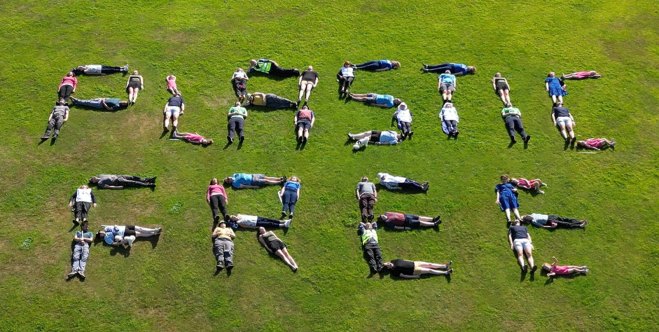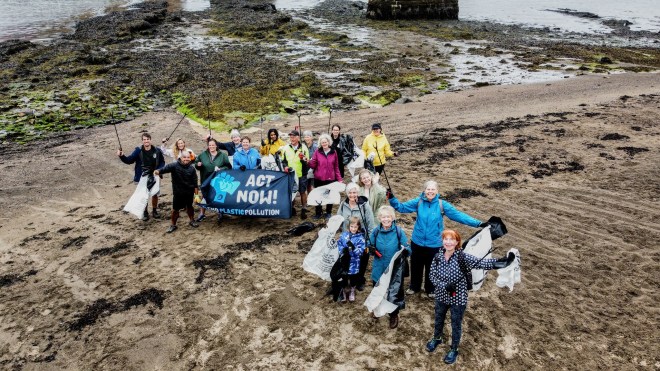Around the Firth of Forth, people have come together to spell out messages calling for an end to plastic pollution as Global Plastics Treaty negotiations take place in Geneva. The groups have taken this action to send a message to the UK representatives that they want them to support a strong agreement that protects people and nature.
In Dalgety Bay, Fife, locals created a distinctly Scottish message by lying down on the beach to spell out “Nae plastics, ta” in the sand. Volunteers from the Plastic-Free Scotland Communities networks in South Queensferry and Dunfermline also created messages supporting a strong treaty.
The Firth of Forth is a hotspot for plastic pollution in the form of plastic pellets which have escaped from nearby production processes. In Scotland, efforts to reduce plastic pollution have so far failed to curb its harmful impacts. Single use plastic bans have not been enforced, and efforts to increase recycling have stalled.
Globally, the massive increase in plastic production, use and disposal has created a crisis as people struggle to cope with the health and environmental impacts created. There is growing evidence that microplastics and chemicals within plastic products are harming our health. Plastics also harm marine animals and contribute to climate breakdown as nearly all plastics are made of fossil fuels.
The solution requires an international agreement to change the way plastics are used for good. The final stage of the Global Plastics Treaty is currently taking place in Geneva. These talks are seen by many involved in the UN process as the last opportunity to reach an agreement after three years of negotiations. With unresolved issues, such as whether the treaty should have binding targets to reduce plastic production, it remains unclear if governments will reach an agreement.
Similar messages of support for the treaty have been created across the world, from Malaysia to Armenia, South Korea and Canada, showing the international support for a future free from plastic pollution.
Kim Blasco from Plastic-Free Dalgety Bay said: “The communities of the Inner Forth are confronted with plastic pollution on a daily basis, whether it be the nurdles blighting our beaches that have been irresponsibly allowed to escape into the environment by the nearby petrochemical facility, the sewage-related debris swilling around in our waters and carpeting our shores, or the vast numbers of single-use plastic bottles and wrappers carelessly tossed into the environment where they can remain for hundreds of years.
“Our plastic-free communities try to get as much as possible of this pollution off our beaches, but it’s a thankless task – as anyone who has ever tried to clean up the likes of nurdles and cotton bud sticks knows. It’s like trying to mop the bathroom floor when the tub is overflowing because you left the tap running – you’ll never stop mopping if you don’t turn the tap off first.
“We need the Global Plastics Treaty to turn the tap off by agreeing targets to reduce plastic production. The petrochemical industry has profited for far too long from the plastic-isation of the economy, with single-use plastics that we don’t want or need. The treaty can be an important step towards stopping this environmental and public health disaster.”
Janet Thomas, from Plastic-Free Queensferry, said: “In 2024, South Queensferry was named as the most beautiful town in Scotland. However, in common with other beaches around the Forth, we are drowning in plastic – the same tourists who enjoy our wonderful town leaving behind all types of litter.
“We need to stop the litter at source – and that’s where the Global Plastics Treaty comes in. We must end the world’s reliance on single use plastic that pollutes for hundreds of years, breaking down into microplastics and entering our food chain. The time to act is now and we call on the world’s governments to take a principled stand against the tide of plastic that is overwhelming our planet.”
Kim Pratt, senior campaigner at Friends of the Earth Scotland said: “People in Scotland are joining the growing chorus of voices from across the world calling for an end to harmful plastic pollution.
“The plastic crisis has been created by greedy corporations, willing to put profit before people’s health and the protection of nature and the environment. Now governments must listen to their citizens and come together to hold corporations to account.
“A strong treaty is a vital part of tipping the balance away from corporate power and towards people and nature. As well as supporting international efforts to curb plastic pollution, the Scottish Government must act now to reduce the damage done by plastic here, including standing up to big businesses and getting them to pay for the cleanup of the plastic products they sell.”
Made up of 11 communities across Scotland, the Plastics-Free Scotland Communities network is fighting back against plastic pollution from the Clyde to the Northwest Coast, the Outer Hebrides, the Moray Firth and the Firth of Forth.




